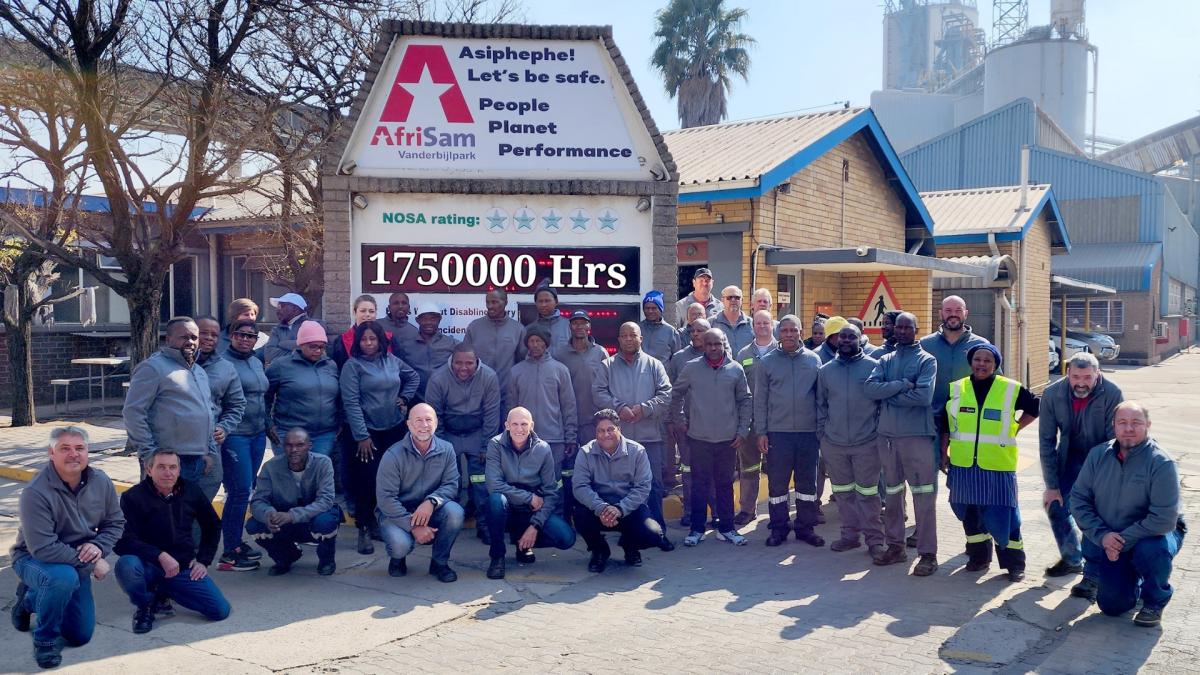
Leading construction material supplier, AfriSam celebrated a significant milestone at the company’s Vanderbijlpark Slagment Operation when it achieved 1,75 million Lost Time Injury (LTI) Free hours earlier this year, demonstrating the high safety standards upheld at this plant. This means that the plant has been injury free for nine years.
As one of the leading players in the supply of aggregates, cement and concrete readymix, AfriSam is committed to safe operation at all its facilities. A strong commitment to ongoing training of its people as well as visible felt leadership underpins the company’s approach to safety and has clearly borne fruit at the Slagment Operation.
The origin of this operation, situated in the industrial area on the outskirts of Vanderbijlpark, dates back to the 1950s when Dr Niko Stutterheim thoroughly researched the suitability of South African slag for manufacturing cement and for use in concrete. His conclusion that the slag was eminently suitable led to the establishment of the company Building Binders Ltd, which was subsequently registered as Slagment Limited in 1960.
Today, this operation still produces slagment and supplies the product to operations within AfriSam as well as to other customers for the manufacture of blended cementitious products.
Slagment is the registered trade name for Ground Granulated Blast Furnace Slag (GGBFS) and is a by-product of the iron- and steel production process. It is a latent hydraulic binder that is used in concrete and other construction applications as a partial cement replacement material. Due to its cementitious properties and depending on the application, slagment can replace up to 70% of Portland cement in concrete, enhancing quality in both fresh and hardened states.
AfriSam’s Vanderbijlpark Slagment Operation has provided slagment for over five decades for the construction of major structures including buildings, dams, bridges, roads and water-retaining structures. The factory has the capacity to produce in excess of 700 000 tons of slagment as well as over 200 000 tons per annum of blended cementitious products.
Some noteworthy projects built with slagment from AfriSam include the Ben Schoeman Highway, the South African Reserve Bank and the Gariep Dam on the Orange River.
AfriSam has long been at the forefront of initiatives to reduce carbon emissions, and this has included leveraging extenders in its composite cements, leading to a substantial reduction in its clinker factor without any compromise on product quality. David Labuschagne, AfriSam Slagment Plant Manager says that key among these extenders is blast furnace slag, a by-product of the steel industry.
“Clinker substitution is not new, but there is a growing trend within South Africa to use more environmentally friendly concrete design mixes that use fly ash or slag.,” he says. Interestingly, the Association of Cementitious Material Producers (ACMP) noted that clinker substitution rose from 12% in 1990 to 41% in 2009, with the industry aiming for a 60% rise by 2030.
AfriSam’s Slagment Operation played a pioneering role in introducing separately ground slag for construction applications, and this plant continues to produce slag. The company sources its raw material from ArcelorMittal South Africa, strategically located near the plant.
The benefits of using blast furnace slag are numerous. It offers enhanced strength and durability and is beneficial in decreasing limestone mining and clinker production, thereby reducing carbon emissions.
“By using a finely tuned mechanical activation method, AfriSam has obtained a more reactive product, enabling the progressive replacement of clinker while maintaining high cementitious quality and strength performance,” Labuschagne says.
With its ongoing commitment to sustainability and innovative strategies, AfriSam continues to pave the way in creating eco-friendly products without compromising on quality.
More news
- PART 2: CONCRETE IN THE DESIGN OF A UNIQUE LUXURY HOME IN GEORGE, SOUTH AFRICA
- PART 1: CONCRETE IN THE DESIGN OF A UNIQUE LUXURY HOME IN GEORGE, SOUTH AFRICA
- MVULE GARDENS, AFRICA’S LARGEST 3D-PRINTED AFFORDABLE HOUSING PROJECT
- PART 3: HARNESSING THE POTENTIAL OF HIGH SULPHUR FLY ASH IN CONCRETE PRODUCTION
- PART 2: HARNESSING THE POTENTIAL OF HIGH SULPHUR FLY ASH IN CONCRETE PRODUCTION

